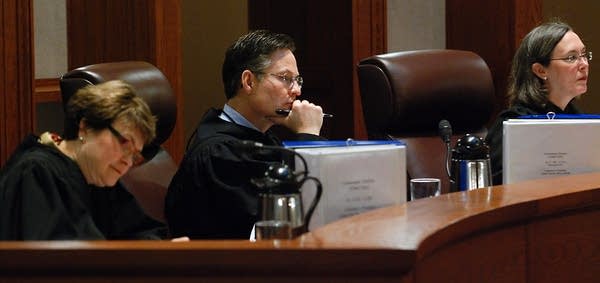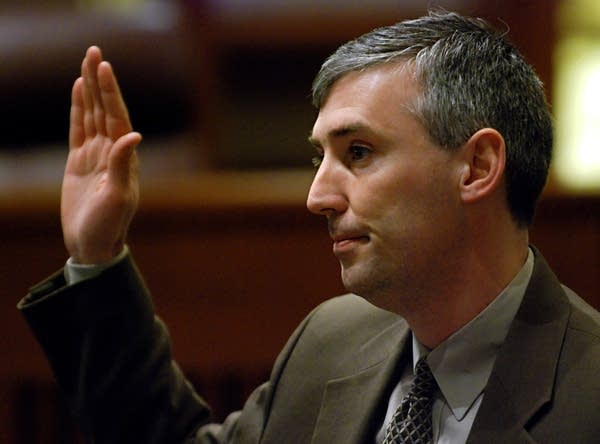Recount trial judges limit Coleman's absentee request
Go Deeper.
Create an account or log in to save stories.
Like this?
Thanks for liking this story! We have added it to a list of your favorite stories.

When the Coleman campaign filed its papers with the court to contest the senate election, it asked the court to consider about 650 absentee ballots. Most recently, Coleman attorneys wanted to expand that number to 11,000.
The judges ruled that the Coleman camp may introduce about 4,800 absentee ballots it claims were wrongly-rejected. Those absentee ballots include:
Those where voters complied with the state election laws and filled out their ballots correctly, but were rejected anyway.
Those ballots where voters wrongly completed a ballot through no fault of their own. An example of this is where an election official sends a ballot to a voter for the wrong precinct.
Turn Up Your Support
MPR News helps you turn down the noise and build shared understanding. Turn up your support for this public resource and keep trusted journalism accessible to all.
The court also limited Coleman to considernig only those ballots raised no later than Jan. 23. That was the Friday before the trial started on Jan. 26.
Coleman attorney Ben Ginsberg called the order good for voters.
"What the order does is allow the thousands of Minnesotans whose votes have not been counted to be counted, or have the chance to be counted," Ginsberg said. "So we're very, very happy about that."

Franken lawyers had asked the three judges to limit the reconsideration to 650 ballots, saying that's what the Coleman side argued when it filed its election contest. Under court rules, when a person files a case such as this, they must set out their claims in their court papers. That's to give the other side notice of what the suit is about so that side can start working on its response to those claims.
The panel said that while the Coleman camp could have been clearer in how it filed its election contest to eliminate any confusion over the 650, the Franken camp had been put on notice that the Coleman camp wanted more ballots considered. It said Coleman's filing contained exhibits that included "ballots that were marked accepted but were in fact rejected...ballots with obvious election judge error on the face of the ballot, and ballots that were delivered to the wrong precinct."
One of Franken's attorneys, Marc Elias, said although they argued for 650, the ruling makes it easier to move on because one of their frustrations has been trying to determine how big Coleman's ballot universe is.
"What does this breadbox look like? Is it a really big breadbox? Is it a smaller breadbox?" Elias said. "That will give us an opportunity to prepare for the witnesses that come in and deal with the ballots they put forward. It will also help us when we decide what our ballot universe is going forward during our case when we get to that."
Franken's legal team has said it has more ballots it wants the court to consider but won't make that argument until Coleman finishes his case.
Guy Charles, who's a visiting election law professor at Duke University, said the ruling is good for Coleman and keeps his case alive.
"Because the more possibilities they have to get votes overturned at 225-vote margin, the better off they're going to be," Charles said. "And 4,800 is definitely presents that possibility and 650 would've made it extremely difficult."
Charles said it is possible that even in considering these 4,800 ballots, Franken's margin may stay the same. But he said Coleman attorneys now have a little more room to argue that previously rejected votes for Coleman can now be counted. Just how the court will count these ballots is still part of the evolving legal process in this case.

Coleman's attorneys say so far, the judges have indicated an interest in going through the ballots one by one.
The U.S. Senate recount trial entered its seventh day Tuesday morning with Republican Norm Coleman's attorneys calling two witnesses to the stand.
One of the witnesses, a voter from of Brooklyn Park, apparently had her absentee ballot rejected because she forgot to sign it.
The second witness called to testify was Kevin Corbid, director of property records and taxpayer services for Washington County.
In his examination of Corbid, Coleman attorney Joe Friedberg is trying to show that different counties applied different standards to rejecting absentee ballots. Corbid oversees election administration for the county.
Corbid testified he didn't accept previously rejected ballots if he had a reason to believe they were rejected because of mistakes by election judges. On Monday, Ramsey County Election Manager Joe Mansky said his staff made every effort to include such ballots.
"Those are all difference between two counties, both completely within Minnesota law, that show that similar ballots have been treated differently by different counties," Coleman attorney Ben Ginsberg said during a midday news conference outside the courtroom. "It means there's an equal protection violation. One voter's vote is counted and another voter, whose ballot looked exactly the same, is not counted.
"In any election, but especially here in Minnesota, the idea is to count as many valid votes as possible," Ginsberg said.
Dear reader,
Political debates with family or friends can get heated. But what if there was a way to handle them better?
You can learn how to have civil political conversations with our new e-book!
Download our free e-book, Talking Sense: Have Hard Political Conversations, Better, and learn how to talk without the tension.




